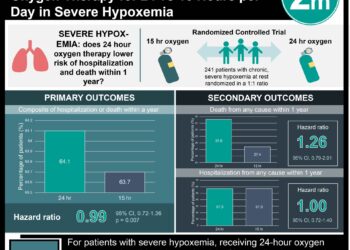Resuscitation of extremely premature infants with room air may increase mortality
1. In an underpowered study, infants less than 28 weeks were more than 3 times more likely to die if given room air during resuscitation.
2. Overall, infants less than 32 weeks’ gestational age resuscitated with room air versus 100% oxygen did not have significant differences in morbidity or mortality
Evidence Rating Level: 1 (Excellent)
Study Rundown: The latest neonatal resuscitation program guidelines recommend the use of lower concentrations of oxygen in the initial resuscitation of preterm infants. This randomized trial examined death and major disability at 2 years of age in infants born at less than 32 weeks and randomized to high or low initial oxygen concentration. The authors found that infants less than 28 weeks’ gestation given room air during resuscitation were found to have a 3-fold higher incidence of neonatal death, although this was analyzing only 100 infants. Overall, and for infants between 29 and 31 weeks’ gestational age, no significant difference was found in rates of neonatal death. Infants receiving 100% oxygen required longer respiratory support, but there was no difference in other morbidities. The study was underpowered for the outcome of death owing to recruitment difficulties and lack of equipoise in the community for starting resuscitation with 100% oxygen (the guidelines for targeted oxygen saturations were published during the recruitment phase). Overall, the study suggests an important avenue of research to assess the effects of 100% oxygen versus room air in preterm infants less than 28 weeks.
Click to read the study, published today in Pediatrics
Relevant Reading: Neurodevelopmental outcome of infants resuscitated with air or 100% oxygen: a systematic review and meta-analysis.
In-Depth [randomized trial]: This study examined 290 infants born at less than 32 weeks’ gestational age at centers in Australia, Malaysia, and Qatar. Infants were randomized to receive either 100% oxygen or room air during resuscitation. At 290 infants, the study was underpowered to analyze the primary outcome of death in the neonatal period. During resuscitation, heart rates were significantly lower for the room air arm during the first 3 to 4 minutes of life and oxygen saturations were significantly lower up to the 8th minute of life, with room air infants meeting target saturations significantly later than 100% oxygen counterparts. Infants receiving 100% oxygen required longer respiratory support (ventilator, continuous positive airway pressure or high- or low-flow nasal cannulas) compared to those who received room air resuscitation (21.6 days and 35.3 days, respectively, p = 0.01). Infants less than 28 weeks were significantly more likely to die before discharge or in the first 28 days of life if they received room air (risk ratio 3.9, 95% CI 1.1-13.4, P=0.01). There was no significant difference in neonatal mortality for the group as a whole, nor for infants aged 29-31 weeks.
Image: PD
©2016 2 Minute Medicine, Inc. All rights reserved. No works may be reproduced without expressed written consent from 2 Minute Medicine, Inc. Inquire about licensing here. No article should be construed as medical advice and is not intended as such by the authors or by 2 Minute Medicine, Inc.







